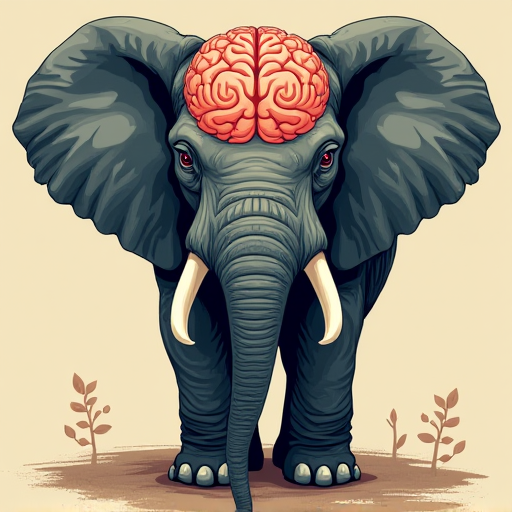
Why Do Elephants Never Forget?
The phrase "an elephant never forgets" is a common adage often used to describe someone with a remarkable memory. This saying is rooted in the belief that elephants possess an exceptional ability to remember past events, locations, and individuals. But is there any truth to this claim? Let's explore the cognitive capabilities of elephants and understand why they are often associated with having a great memory.
The Elephant Brain
Elephants are known to have one of the largest brains in the animal kingdom. An adult elephant’s brain can weigh between 4.5 to 5.5 kilograms (10 to 12 pounds), making it the largest among land mammals. This large brain size is proportional to their body size and is a factor that contributes to their complex cognitive functions.
Structure and Functionality
The cerebral cortex, which is responsible for higher brain functions such as memory, attention, perception, cognition, awareness, thought, language, and consciousness, is highly developed in elephants. They have an extensive network of neurons, comparable to that of humans and dolphins, animals also known for their intelligence and memory capabilities.
Memory and Social Structure
Elephants are highly social creatures, living in matriarchal herds led by an older, experienced female. The social dynamics within elephant herds rely heavily on memory. The matriarch's knowledge of the environment, including the location of water holes, food sources, and safe passages, is vital for the survival of the group, especially in challenging conditions like droughts.
Long-Term Memory
Elephants have shown the ability to recognize individual members of their herd even after long periods of separation. They can also remember and distinguish between different human beings based on past experiences, such as distinguishing between friendly researchers and potential threats like poachers.
Emotional Memory
Elephants exhibit emotional intelligence, showing behaviors such as mourning the dead, which suggests a capacity for remembering past events and individuals. This emotional memory may be linked to their ability to form complex social bonds and navigate their social networks.
Scientific Studies and Observations
Several studies have provided insights into the remarkable memory of elephants:
-
Recognition and Tool Use: Elephants have demonstrated the ability to recognize themselves in mirrors, an indication of self-awareness, and have been observed using tools, which requires memory and problem-solving skills.
-
Spatial Memory: Research has shown that elephants have an impressive spatial memory. They can remember the locations of water and food sources over large distances and long periods, crucial for their survival in the wild.
-
Social Memory: Elephants can remember individuals and their past interactions. Studies with captive elephants have shown that they can differentiate between calls from familiar and unfamiliar individuals.
Evolutionary Perspective
From an evolutionary standpoint, the memory capabilities of elephants likely developed as an adaptive trait. In their natural habitats, where resources can be scarce and predators pose a threat, having a strong memory aids in survival and reproductive success. The ability to remember environmental cues, social relationships, and past experiences is crucial for navigating the challenges of their ecosystems.
Conclusion
The saying "an elephant never forgets" reflects the impressive cognitive abilities of elephants, particularly their long-term memory and social intelligence. While it is an exaggeration to claim that elephants never forget, substantial evidence supports the notion that they have an extraordinary capacity for remembering events, individuals, and places. This ability is not only fascinating but also crucial for their survival and the maintenance of their complex social structures. As research continues, we may uncover even more about the intricate and intelligent minds of these majestic creatures.
